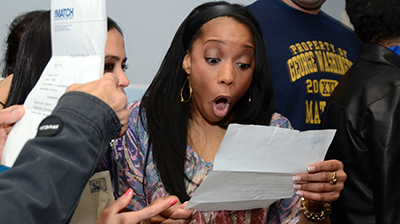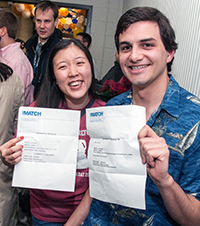School of Medicine and Health Sciences Class of 2014 Ready to Transition to Residency
It’s hard to describe how Amy Waldner, a fourth-year medical student at GW’s School of Medicine and Health Sciences (SMHS), was feeling March 21 in the waning minutes leading up to Match Day — elated, anxious, maybe even a little sad. “You work so hard through four years of medical school, hoping that everything will work out the way you want it to on this day,” said Waldner, who hoped to join her boyfriend, a first-year anesthesiology resident, at the University of Pennsylvania (Penn).

Match Day marks what most medical students call one of the most pivotal moments in their medical education — the transition between medical school and residency.
“Match Day is a crucial milestone in the life of any physician,” explained Jeffrey S. Akman, M.D. ’81, RESD ’85, Walter A. Bloedorn Professor of Administrative Medicine, vice president for health affairs, and dean of SMHS. “It’s when medical students learn where they will be doing their residency training. Our students match with some of the leading medical institutions in the country, including GW, in every specialty that you can imagine.”
Students surrounded by family, friends, and faculty members gathered in Ross Hall to celebrate this milestone. As the clock struck noon, the students joined with colleagues from schools across the country as they simultaneously received and opened their envelopes from the National Residency Matching Program, a nonprofit corporation established to provide a uniform date of appointment to U.S. graduate medical education positions. SMHS students were among nearly 16,000 medical students learning where they will spend the next three to five years of their careers, fulfilling their residency requirements.
Waldner got her wish, matching in emergency medicine at Penn. “It’s a dream come true,” she said, fighting back tears with her letter in hand. “I prepared for the worst and hoped for the best.”

For Jeffrey Berger, M.D., associate professor of anesthesiology and critical care medicine at SMHS and the new interim associate dean for graduate medical education, Match Day is equally exciting. “We find out exactly who is coming to our program,” he said. “There will be some familiar faces that come from GW and some that come from outside institutions. Being chosen by top-notch students is validating of our efforts,” he added.
GW has anywhere from two to 20 residents per program at a time, explained Berger. “In the anesthesiology program, we might receive more than 900 applications for eight positions,” he added. “This gives you a sense of the challenge program directors like me face. You have this crop of students who made it into medical school, who are all outstanding individuals with exceptional academic records, and you are, in a sense, trying to split hairs with a one in 100 ratio. It’s a tricky process.”
GW’s Class of 2014 matched at many of the nation’s most competitive programs, including Harvard University, Johns Hopkins Hospital, Boston University Medical Center, Baylor College of Medicine, and Northwestern University. Eleven SMHS students were picked to continue their training at GW, and five others will train at SMHS clinical partner Children’s National Health System. [hr]
Related Content:
- Click to watch a video of Match Day 2014
- Click to view photos of GW SMHS Match Day 2014
- Click for the Full Match List



